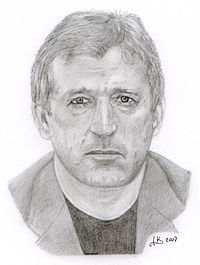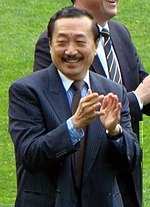FK Sarajevo
Namely, Hodžić, Vlajičić, Šarenkapa, Pauković, Fizović, Konjević, Radović, Viđen and Mustagrudić from the former, and Mantula, Glavočević, Tošić, Pecelj, Novo, Strinić, Đ. Lovrić and Alajbegović from the latter.
The league had long been dominated by the so-called "Big Four" of Yugoslav football, but the Bosnian breakthrough finally arrived in the 1966–67 season, when FK Sarajevo emerged as champions.
This victory not only marked a significant milestone for Bosnian football but also ended an unprecedented eight-season dominance by clubs from SR Serbia, who had held the national crown uninterrupted.
[13] The historic season began with Brozović as head coach, and the team had a strong start with consecutive wins against Sutjeska Nikšić and city rivals Željezničar, followed by a draw against European Cup runners-up Partizan.
Despite an early lead, Sarajevo managed seven points from their first three fixtures and, though not initially considered title favorites, they gained momentum with a victory against Hajduk Split on the Dalmatian coast.
A week later, they beat OFK Beograd by the same margin, but a surprising defeat to Vojvodina in Novi Sad left them tied with Dinamo Zagreb with three games remaining.
The 1973–74 season saw the arrival of several new players, including future club legend Želimir Vidović and former Red Star Belgrade and Bayern Munich striker Dušan Jovanović.
However, the 1978–79 season brought renewed hope for Sarajevo fans as the team finished 4th, behind Hajduk Split, Dinamo Zagreb, and Red Star Belgrade, signaling better times ahead.
Predrag Pašić, nicknamed "Paja," was a winger or striker who rose through the club's youth ranks and played for Sarajevo until his move to VfB Stuttgart after the title-winning season in 1985.
[21] Sarajevo returned to the UEFA Cup in 1982–83 (having finished fourth during the 1981–82 season), beating Bulgaria's Slavia Sofia 6:4 in the first round[22] and Romanian club FC Corvinul Hunedoara 8:4 in the second, thanks to a 4:0 home win in the second leg.
Now needing just five points from their last three games to clinch the title, Sarajevo achieved a routine 3–0 victory over Iskra, followed by a challenging 2–2 draw against Vardar in Skopje, after coming back from a 2–0 deficit just before halftime.
The championship winning generation included the likes of Husref Musemić, Faruk Hadžibegić, Davor Jozić, Dragan Jakovljević, Miloš Đurković, Predrag Pašić, Mirza Kapetanović, Slaviša Vukićević, Zijad Švrakić, Senad Merdanović and Mehmed Janjoš.
[31] The club management, in search of replacements, turned its sights to young players from lower-tier sides, bringing in Bernard Barnjak, Vladimir Petković and Zoran Ljubičić.
His nine goals in 26 appearances did little to improve league results, as the team again concluded the campaign in 13th spot, along with an early exit in the Yugoslav Cup after a defeat to Macedonian third division minnows, FK Sileks.
In addition the club reached play-off stage/final qualifying round for European competitions on 4 occasions, once for UCL (vs Dynamo Kyiv) and three for UEL (vs CFR Cluj, Borussia Mönchengladbach and Celtic).
[38] The second round saw Sarajevo defeat Belgians KRC Genk on away goals due to a 2:1 away win in the first leg,[39] although the club was knocked out in the play-offs for the competition's Group stage by Ukrainian champions Dynamo Kyiv who won 4:0 on aggregate.
[77][78] The main artificial turf pitch is named after club legend Želimir Vidović, who was killed during the Siege of Sarajevo while transporting wounded citizens to a nearby hospital.
[82] Furthermore, the fact that the largest contributor may negotiate profit provisions between himself and the club opens the possibility for large-scale financial investment that exceeds charitable and non-profit contributions that are usually the cornerstone of companies limited by guarantee.
[92] The club has a variety of other sponsors and official partners, which include Tourism Malaysia, Peugeot, Telemach, BH Telecom, Securitas, NLB Group, Mtel Bosnia and Herzegovina, Sarajevska pivara and others.
[103] The club is dedicated to the development of Srebrenica, awarding yearly scholarships to hundreds of children from the town and sponsoring the local multiethnic football team, FK Guber.
The team wore specially designed jerseys featuring the words "Fighter, Survivor, & Honor," aligning with the colors and symbols of the official campaign in collaboration with the organization "Think Pink.
[158] Six of the fifteen former Bosnia and Herzegovina national team managers are former FK Sarajevo players: Fuad Muzurović, Džemaludin Mušović, Faruk Hadžibegić, Denijel Pirić, Miroslav Blažević and Safet Sušić.
[164] The club was established in June 2000 as part of the "Alija Miladin" recreational association, subsequently affiliating with a now-defunct men's football team from Sarajevo's Otoka neighborhood.
[168] The club once again qualified for the round of 32, this time in the 2018–19 UEFA Women's Champions League season, but got eliminated by Chelsea F.C..[169][170] SFK 2000 operates a youth academy for girls from the ages of five to sixteen.
[175] This relationship is rooted in their shared maroon and white club colours, leading KK Bosna to attract most of its fan base from FK Sarajevo during its rise in the mid and late 1970s.
The nickname, meaning a consumer of the local Bosnian dish pita, was originally a derogatory label given by fans of working-class Željezničar that implied the pre-World War Two upper-class background of most FK Sarajevo supporters.
Even though the rivalry between the two sides grew large from the very foundation of FK Sarajevo,[190] the two teams only met in friendly fixtures for the better part of a decade because they competed in different levels of the Yugoslav football league system.
[194] The music video for the song Everyday by American rock band Bon Jovi was partly filmed at the Koševo stadium and depicts the name FK Sarajevo.
The songs Nedelja kad je otiš'o Hase and Džana by Yugoslav and Bosnian punk rock band Zabranjeno Pušenje reference the club.
The former is a song about a young boy heading to the Koševo stadium to watch a testimonial match against Osijek dedicated to club legend Asim Ferhatović, which is a direct metaphor for the death of Yugoslav president Josip Broz Tito.











